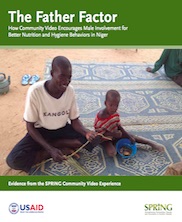Previous studies that explored interventions aimed at improving maternal, infant, and young child nutrition (MIYCN) behaviors primarily focused on the mothers of young children. Interest is growing in understanding how nutrition practices can be supported by involving other household members who provide social support and influence these practices, specifically mothers-in-law and husbands.
In Niger, where the Strengthening Partnerships, Results, and Innovations in Nutrition Globally (SPRING) project has worked to improve nutrition since 2015, MIYCN behaviors are influenced by cultural norms and practices, including polygamy and an emphasis on male decisionmaking. In addition, literacy levels are low and the people who influence MIYCN practices are also influenced by the surrounding cultural and social norms and practices.
The SPRING project has implemented a facilitated community video project to promote high-impact MIYCN and hygiene behaviors. Produced locally, the videos feature community members performing as actors and focus on many key themes, such as dietary diversity, handwashing, exclusive breastfeeding, and complementary feeding practices. Field mediators share the videos with community groups, lead interactive discussions following the videos, and conduct home visits to address any questions raised by participants.
To promote continued program learning, this report explains how the community video approach can be used to strengthen spousal communication and improve male involvement in MIYCN behaviors.
This paper highlights the study’s methodology and findings, includes a discussion as well as conclusions and recommendations. JSI/Strengthening Partnerships, Results, and Innovations in Nutrition Globally (SPRING) project. 2017.


